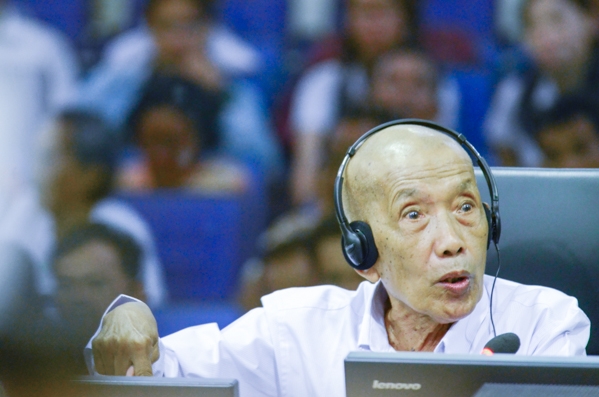On his fourth day of testimony for Case 002/02 against Khmer Rouge leaders Khieu Samphan and Nuon Chea, former S-21 chief Kaing Guek Eav, also known as Duch, continued to deny any instances of rape took place at the infamous Khmer Rouge detention center and was questioned further about interrogation tactics as well as the treatment of Vietnamese prisoners.
Continuing her line of questioning on rape at S-21, Civil Party Co-Lawyer Marie Guiraud described a sexual assault involving a stick that was confirmed at the center by previous witnesses and asked Mr. Guek Eav what had been done to the soldier after he was accused.
In line with last week’s testimony, Mr. Guek Eav said he tried to punish the soldier, but was not allowed to because of “party rules.”
“I was angry. I told them to remove him from the women’s interrogation unit and I reported it to Son Sen,” he said. “I do not have the authority to make an arrest, so I tried to transfer him to another post. But no one reacted to my report so no one was ever arrested.”
He claimed to have created a special interrogation unit made up of the wives of the facility’s leaders because of the incident, but Ms. Guiraud immediately showed he may have been lying – two interrogators who worked at S-21 and testified previously said they had never seen any female interrogation unit and were often asked to interrogate women themselves.
She then moved on to sex and marriages at S-21, and questioned what happened to prisoners caught having sex.
“If people were caught in action outside of marriage, they were smashed,” he said. “Some were allowed, but most were arrested for misconduct.”
He added that the issue became more of a problem later on in the Khmer Rouge reign, even saying one man fled and joined an opposing army because his request for marriage was rejected.
Mr. Guek Eav harped on this point, often saying only cases like these, where prisoners were caught having consensual sex, were the only ones found. Rape, he said, was nonexistent.
“There were no cases of violent rape,” he said. “But there were cases of love.”
Torture and the Vietnamese
Mr. Guek Eav continued his attempts to partially absolve himself when questioned about torture tactics used at S-21. National Civil Party Lead Co-Lawyer Pich Ang asked him about testimony from a witness who claims to have had the nails on his big toes removed with pliers and a finger broken. Interrogators also put needles into his toes repeatedly.
“I instructed him [his subordinate] to stop this kind of practice,” he said of the toe nail removal. “I authorized electrocution. But I forbid them from killing any prisoners because we needed their confession.”
The need for confessions took new importance with Vietnamese soldiers who had been captured by the Khmer Rouge. Starting in January 1978, after the first Vietnamese soldier was brought to S-21, recordings of their confessions would be broadcast over loudspeakers on direct orders from Mr. Chea.
Mr. Chea would often edit the confessions to fit the needs and desires of the Khmer Rouge leaders. They even took the time to create a film about the Vietnamese army, using detained soldiers to act in the film before murdering them outside S-21.
Despite constant denials, obfuscations and question-dodging, Mr. Guek Eav did openly question and criticize the Khmer Rouge tactic of burying the dead after they were killed, saying the practice was not part of Khmer culture. Buddhist tradition generally calls for cremation as opposed to burials.
“For prisoners, after they were smashed, they were buried,” he said. “That was against our tradition. Against our customs.”
http://www.khmertimeskh.com/news/26076/duch-talks-torture--vietnamese-at-krt/




